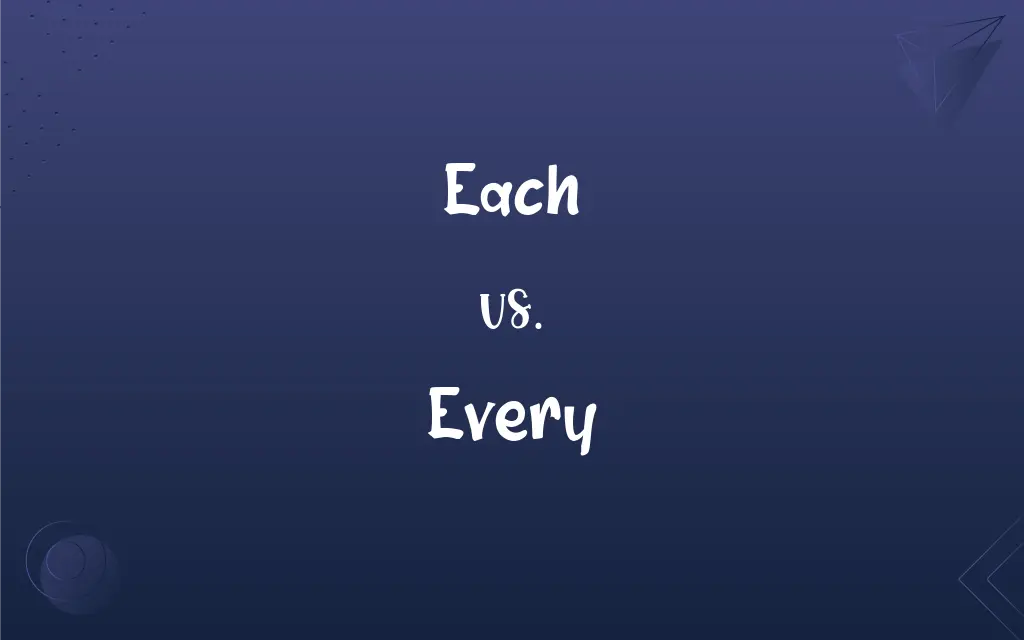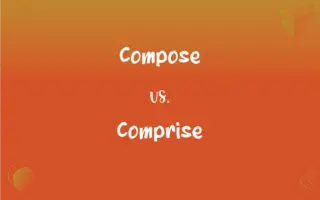Each vs. Every: What's the Difference?
Edited by Harlon Moss || By Janet White || Published on November 23, 2023
"Each" refers to individual items in a group, emphasizing singularity, while "Every" refers to all members of a group collectively.

Key Differences
"Each" and "Every" both relate to the members of a group, but they place emphasis differently. "Each" looks at the members of a group as individual units, whereas "Every" views them as a collective.
When we use "Each," we're often considering items or people one by one. This term stresses individuality and distinction. "Every," in contrast, groups items or people together, suggesting totality or universality without focusing on individual characteristics.
Another distinction lies in their grammatical application. "Each" can be used as a pronoun and an adjective, while "Every" is primarily used as an adjective. This means you can say "Each of the books" or "Each is unique," but only "Every book" and not "Every is unique."
In some contexts, "Each" and "Every" might seem interchangeable, but their nuanced difference can alter the meaning or emphasis of a sentence. For example, "Each student won a prize" implies all students won different prizes, while "Every student won a prize" suggests all won the same or a similar prize.
Furthermore, "Every" often denotes regularity or frequency, which "Each" doesn't necessarily convey. For instance, "Every morning, she jogs" denotes a regular action, whereas "Each morning" can be seen in specific contexts, not necessarily implying daily repetition.
ADVERTISEMENT
Comparison Chart
Basic Emphasis
Individual items/people
All members of a group
Grammatical Role
Can be a pronoun and an adjective
Primarily an adjective
Typical Context
Often used when mentioning items/people one by one
Often used when referring to regular occurrences
Example Implication
"Each child has a toy" (may have different toys)
"Every child has a toy" (all have the same/similar toy)
Frequency Connotation
Doesn't necessarily imply regularity
Often denotes regularity
ADVERTISEMENT
Each and Every Definitions
Each
Used for emphasizing individuality.
Each design is unique in its way.
Every
Used to emphasize the typical or average nature of something.
Every bit helps.
Each
Denoting one of two in a pair.
She wore a ribbon on each ankle.
Every
Indicating repetition at regular intervals.
We meet every Saturday.
Each
Every single one without exception.
They each have their own strengths.
Every
All possible or available.
They utilized every resource.
Each
Referring to every single member of a group individually.
Each student received a different book.
Every
Indicating the highest degree or extent.
Every effort was made to succeed.
Each
Indicating division or distribution.
The prize was split between each participant.
Every
Constituting each and all members of a group without exception.
Each
Being one of two or more considered individually; every
Each person cast a vote. My technique improved with each lesson.
Every
Being all possible
Had every chance of winning, but lost.
Each
For or to each one; apiece
Ten cents each.
Every
Being each of a specified succession of objects or intervals
Every third seat.
Every two hours.
Each
All; every; qualifying a singular noun, indicating all examples of the thing so named seen as individual or separate items (compare every).
Make sure you wash each bowl well.
The sun comes up each morning and sets each night.
Every
Being the highest degree or expression of
Showed us every attention.
Had every hope of succeeding.
Each
For one; apiece; per.
The apples cost 50 cents each.
Every
Of a countable group (considered individually), without exception.
Every person in the room stood and cheered.
Each
Every one/thing individually or one by one.
I'm going to give each of you a chance to win.
From each according to his ability, to each according to his needs.
Every
Denotes equal spacing at a stated interval, or a proportion corresponding to such a spacing.
We stopped for refreshments every ten miles.
The alarm is going off every few minutes.
Every third bead was red, and the rest were blue. The sequence was thus red, blue, blue, red, blue, blue etc.
Decimation originally meant the execution of every tenth soldier in a unit; that is, ten per cent of soldiers were killed.
Each
An individual item: the least quantitative unit in a grouping.
Every
(with certain nouns) Denotes an abundance of something.
We wish you every happiness in the future.
I have every confidence in him.
There is every reason why we should not go.
The police will make every effort to trace the missing girl.
Each
Every one of the two or more individuals composing a number of objects, considered separately from the rest. It is used either with or without a following noun; as, each of you or each one of you.
It is a bad thing that men should hate each other; but it is far worse that they should contract the habit of cutting one another's throats without hatred.
Let eachHis adamantine coat gird well.
In each cheek appears a pretty dimple.
Then draw we nearer day by day,Each to his brethren, all to God.
The oak and the elm have each a distinct character.
Every
All the parts which compose a whole collection or aggregate number, considered in their individuality, all taken separately one by one, out of an indefinite number.
Every man at his best state is altogether vanity.
Every door and window was adorned with wreaths of flowers.
Each
Every; - sometimes used interchangeably with every.
I know each lane and every alley green.
In short each man's happiness depends upon himself.
Every
Every one. Cf. Each.
Daily occasions given to every of us.
In each division there were four pentecosties, in every pentecosty four enomoties, and of each enomoty there fought in the front rank four [soldiers].
If society is to be kept together and the children of Adam to be saved from setting up each for himself with every one else his foe.
Each
(used of count nouns) every one considered individually;
Each person is mortal
Each party is welcome
Every
Each and all of a series of entities or intervals as specified;
Every third seat
Every two hours
Each
To or from every one of two or more (considered individually);
They received $10 each
Every
(used of count nouns) each and all of the members of a group considered singly and without exception;
Every person is mortal
Every party is welcome
Had every hope of success
Every chance of winning
Every
Referring to all members of a group collectively.
Every child knows that story.
FAQs
Which word suggests all members without exception?
Both "Each" and "Every" can suggest that.
Does "Each" always suggest different items?
Not always, but it can emphasize individuality.
Is "Each" more singular or plural?
"Each" emphasizes singularity within a group.
Does "Every" work as a pronoun?
No, "Every" is primarily an adjective.
How do I use "Each" in a sentence?
"Each" can follow a noun or stand alone. E.g., "Each student" or "Each of them."
Can "Every" emphasize individuality?
Less so than "Each." "Every" is more collective.
Can "Each" be used as a pronoun?
Yes, as in "Each was given a chance."
Is "Every" used to denote regularity?
Yes, like in "Every day I exercise."
Is "Each" used for distribution?
Yes, as in "five dollars each."
Can I say "Each and Every" together?
Yes, it's an expression emphasizing totality, like "Each and every one of you."
Can I use "Every" for two items?
No, "Every" is used for groups of three or more. For two items, use "Both" or "Each."
How does "Each" work in terms of division?
"Each" can indicate division among a group, like "one book each."
Is "Every" always about regular occurrences?
Not always, but it can suggest regularity.
Can I interchange "Each" and "Every" freely?
Not always. While similar, they have distinct nuances and grammatical roles.
Does "Every" work with specific numbers?
No, for specific numbers, "Each" is more suitable.
Which word is more universal?
"Every" has a more universal, collective feel.
How do I use "Every" in terms of frequency?
Pair it with time, like "Every week" or "Every winter."
What's the primary difference in emphasis?
"Each" stresses individuality; "Every" views a group collectively.
Is "Every" suitable for pairs?
No, for pairs, "Each" is more appropriate.
Can "Each" denote all members of a group?
Yes, as in "Each of the students passed."
About Author
Written by
Janet WhiteJanet White has been an esteemed writer and blogger for Difference Wiki. Holding a Master's degree in Science and Medical Journalism from the prestigious Boston University, she has consistently demonstrated her expertise and passion for her field. When she's not immersed in her work, Janet relishes her time exercising, delving into a good book, and cherishing moments with friends and family.
Edited by
Harlon MossHarlon is a seasoned quality moderator and accomplished content writer for Difference Wiki. An alumnus of the prestigious University of California, he earned his degree in Computer Science. Leveraging his academic background, Harlon brings a meticulous and informed perspective to his work, ensuring content accuracy and excellence.






































































